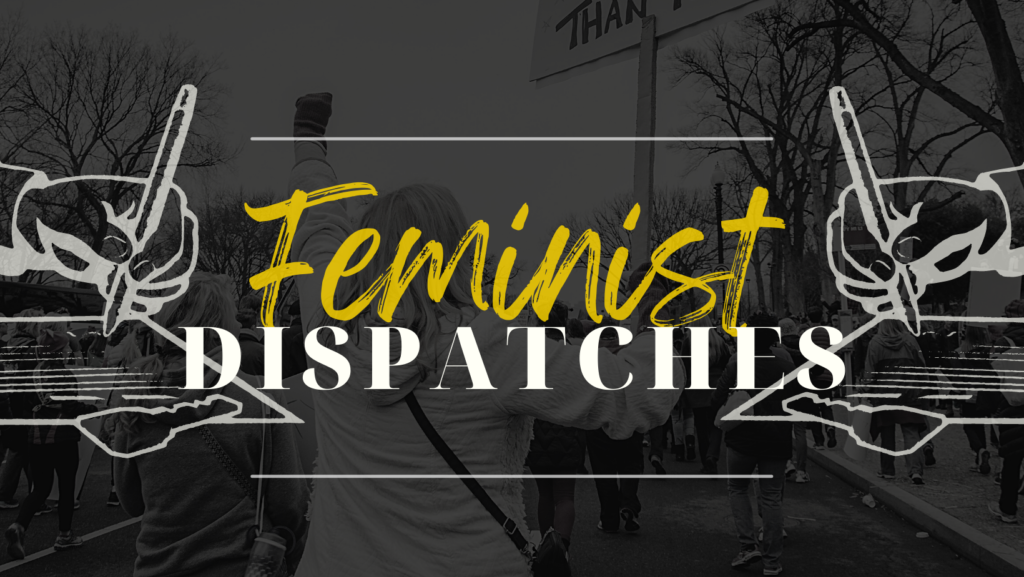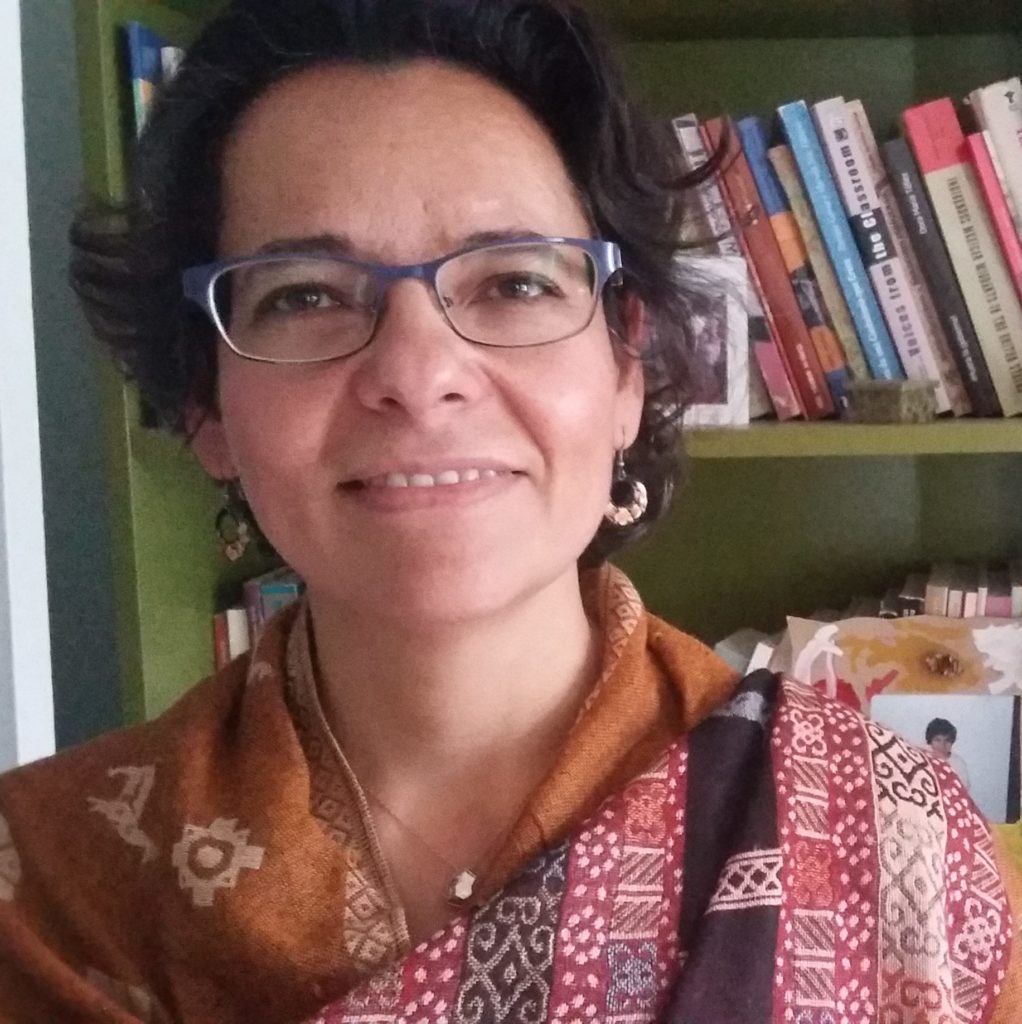Dispatch by María Gloria Cayulef, Dolores Figueroa Romero, and Ruth Murambadoro

On January 20, 2023, we held an online transnational workshop for graduate students that invited participants to explore aspects of the research process that may be underestimated or unspoken, including the role of emotions, political commitments, and relationships in shaping research. Such an approach draws on a “thinking-feeling” feminist epistemology (Cariño & Montenegro, 2022; Mendez et al., 2013). Interventions by María Gloria Cayulef, Dolores Figueroa, and Ruth Murambadoro employed feminist, decolonial and Indigenous frameworks to foster a multidimensional understanding of research. These engagements are centred on challenging and changing Western and patriarchal conceptions of thinking about knowledge, the actors involved, their processes, and research goals. Here we provide a summary of each intervention.
The Affective Dimensions of Research from an Indigenous Perspective by María Gloria Cayulef
The following reflections are concerns that have accompanied me throughout the doctoral research process. They are embodied reflections that arise from the experience of situated research, which seeks to incorporate an Indigenous epistemology in the process of knowledge construction. Such an approach crosses the boundaries of what is conceived as research as a purely intellectual exercise, and in this transcending, it embraces other dimensions of being, such as the affective dimension. It is the latter that I emphasize here.
In the exercise of connecting with the affective dimensions of research, I ask myself: Where does the motivation for wanting to do research come from? At what point in our lives have our interests in exploring this or that have been lodged? How long do they live nestled in us until we finally dare to embark on the path of searching for answers? What do we feel before, during, and after doing research? How do we open ourselves to feeling while what we think permeates this search? Talking about emotions implies subverting the cartesian thinking that dichotomizes between civility/savagery, progress/stagnation, nature/society, mind/body, reason/emotion, and a long etcetera of binarisms incorporated by force.
This dichotomous thinking has done nothing more than create and recreate colonial violence, including the ways of knowing and constructing knowledge. The Euro-centered epistemological framework has defined what is true knowledge or, simply, what is truth, and has determined which voices are considered valid to produce it, legitimizing some voices over others.
Colonial violence, then, has taken the form of epistemic violence. It has been historically configured as a research practice of One (legitimized) on an Other (the object of this process, lacking the agency to do it by themself), through research on Indigenous cultures from the outside by the outsider (Smith, 2016). Such extractivist research (Kovach, 2021) leaves those being studied marginalized or deprived of rights over the knowledge taken away from them, from us.
Indigenous research means validating not only the personal experience but the collective experience, re-appropriating the knowledge rooted in the culture under the onto-epistemological framework of the culture itself. A difficult task, as Absolon (2011) points out, decolonizing research is also uncomfortable and risky.
In this sense, using an affective approach, research is closely related to both the political and ethical dimensions; it confronts us with the responsibility associated with that feeling, with what we do with the emotions that emerge and surround our research. In this regard, we should consider whether we are incorporating an ethic of care (Gilligan, 1982) or, as bell hooks (1994) puts it, a social justice-oriented ethic of engagement, and ask ourselves: How do I feel about the people I am researching with? What do I think/feel about them? About their lives? Furthermore, how does this relate to my research, and what do I do with all these emotions?
Political Commitments in the Research Process by Dolores Figueroa Romero
This section explores the political engagement of scholars in supporting the struggles of social movements and community organisations to achieve social change (BonfilBatalla, 1977; Hale, 2004). My point of reference is Latin America, a region in which social scientists have always been deeply concerned about the socio-economic inequality, structural discrimination, and gendered and racialised violence that characterize Latin American societies. Accordingly, progressive social researchers are inclined to use their academic skills to contribute to social actors’ actions in achieving social change and justicethrough social research, popular education, advocacy work, and awareness-raising processes (Hale, 2004; Hartmann, 1981; Jimeno, Murillo & Martinez, 2012).
Undertaking solidarity with social struggles for justice is not an easy task. Being committed to the poor (as liberation theologists would say) entails many challenges. Do we – social researchers and community-based leaders– foresee social change and justice in the same way? Do we coincide in the strategies to follow? Do our actions have the same meaning? A decolonial lens adds further complexity. Tuck and Yang (2012) have profoundly critiqued the role of privileged academics in making space for their interventions and adoption of social justice projects. They have pointed out that decolonization is a distinct project from other civil or human rights justice projects. It entails a deconstruction of the link between academics and social actors that is tainted by colonial power relations/tensions. Academics’ class/race privilege has been bypassed in very problematic ways (Tuck &Yang, 2012). What was once assumed as proactive and consequential solidarity with Indigenous organizations, workers, peasants, and community-based women, is now a terrain of inquiry into the practices of knowledge production and social representation (Hale, 2004).
I was trained as anthropologist in Mexico where there is a long tradition in producing knowledge about Indigenous peoples, their cultures, and social struggles. Indigenous women’s rights have been a particular focus in the scholarship of non-Indigenous anthropologists. In the last couple of years, I have been collaborating with Indigenous women’s organizations in searching for and implementing strategies to fight against gender-based violence. In pursuing this task, I have become aware of their concerns around the criminal violence that inflicts damage in rural communities, which has gone unnoticed until very recently. In Mexico, the feminist movement is deeply concerned with the rampant violence that is spreading like a weed throughout the country, and the production of knowledge on this phenomenon is crucial. The feminicide rates of working class and Indigenous women and girls are sky rocking, and one of the tools identified by the feminist movement for documenting gender-based violence is the use of quantitative methods to gather data on violence. By using statistics, they aim to represent – and quantify– the impact of patriarchal violence on communities, especially when state institutions place very little interest in preventing gender violence. I deeply admire those efforts but must also mention that national feminist organizations’ quest against feminicidal violence is blind to the intersectional identities of the victims, especially Indigenous women victims. In addition, mainstream feminism demonizes Indigenous culture as a site of gender oppression and violence (Figueroa, 2019).
I have come to realize that Western feminism has a colonial and patronizing gaze over Indigenous women. Gender justice and the mechanism to achieve it are crafted according to Western feminist expectations (Herr, 2020). Decolonizing social research in my case is deeply linked to my efforts to contribute to the organizing process of Indigenous women organizations in Mexico. Despite my good will, I must continuously check whether I am following my own academic inquiry or listening to what grassroots organizations’ leaders are demanding and looking for.
Understanding the Research Process as Relational by Ruth Murambadoro
A decade of doing fieldwork on effects of state-sanctioned violence on marginalized communities in Zimbabwe and other African countries has taught me the value of relational social capital in gathering rich qualitative data. Here the term ‘relational social capital’ is used to describe the network of relations and value system underpinning interactions and connections that various people embody (Steinmo & Rasmussen, 2018), which informs partnerships that can be leveraged in the research process. Several studies on social capital and knowledge creation have established that social connections promote positive attitudes and a sense of belonging that erode the suspicions people often have when dealing with persons unfamiliar to them (Sheng & Hartono, 2015). Applying this phenomenon to social research helps us to understand how human relations are critical in qualitative studies.
Human relations foster trust, connectedness and a sense of familiarity that promotes fluid interactions, even on subject matter that may be deeply sensitive or politicized. My research process has benefitted from establishing stronger relational ties with research participants making it crucial for me to recognize both the ethical and societal obligations I carry as a researcher. Positivist research ethics enthusiasts would require a researcher to keep a distance between themself and the research community to maintain a good degree of objectivity (Darwin Holmes, 2020).
However, I believe that a researcher and the research community are social beings and as such they do not have a linear relationship that can be put in a box (Dazzo, 2023). Instead, people connect at multiple levels that create a chain of relations which enable varied exchanges throughout the research journey. Since fieldwork requires one to spend several days, weeks or months embedded in the research community, partaking in the day-to-day life of the studied community inevitably requires one to harness their way of being to have a deeper appreciation of humanity. For example, in my home country there is a proverb, ukamaigasvahunozadzikiswanekudya, which means that relations are forged through sharing a meal. Hospitality brings people closer because it symbolizes communion and togetherness. Socio-culturally I would reciprocate such hospitality by offering a token of appreciation be it a small grocery hamper or money, which shows that I am attuned to the societal obligations.
Arguably, when one offers something to research participants it creates ethical dilemmas around the researcher’s influence on data gathered (Taquette & Maria Borges da Matta Souza, 2022). Nothing much is acknowledged about the cultural expectations and the humanness of research which shapes research exchanges beyond predetermined ethical guidelines. From my experience, employing culturally relevant research approaches can serve as a catharsis to marginalized experiences and ethical obligations without overshadowing the reality that the research process is a relational engagement between a researcher and research participants who are parties with mutually beneficial interests.
References
Absolon, K. E. (2022). Kaandossiwin: how we come to know: Indigenous re-search methodologies. Fernwood Publishing.
BonfilBatalla, G., et. al. (1977). La declaración de Barbados II y comentarios
Nueva Antropología, vol. II, núm. 7, diciembre, 109-125.
Cariño, C., & Montelongo González, A. (2022). Coloniality of power and coloniality of gender: Sentipensar the struggles of Indigenous women in Abya Yala from worlds in relation. Hypatia,37(3), 544-558. doi:10.1017/hyp.2022.30
Darwin Holmes, A. G. (2020). Researcher positionality - A consideration of its influence and place in qualitative research - A new researcher guide. Shanlax International Journal of Education, 8(4), 1–10. https://doi.org/10.34293/education.v8i4.3232
Dazzo, G. P. (2023). Can research heal? Toward restorative validity: Axiological commitments and methodological obligations as contact zones. International Journal of Qualitative Methods, 22, 1–13. https://doi.org/10.1177/16094069231164937
Figueroa Romero, D. (2019). Políticas de feminicidio en México: Perspectivas interseccionales de mujeres indígenas para reconsiderar su definición teórica-legal y las metodología de recolección de datos.Journal of International Women’s Studies, Vol. 20, Issue 8 Issue 2 (of 2) Women ́s Movements and the Shape of Feminist Theory and Praxis in Latin America. October. https://vc.bridgew.edu/jiws/
Hale, C. R. (2004) Reflexiones hacia la Práctica de una Investigación Descolonizada **Draft document for discussion**Anthropology Program at Texas University in Austin October
Hartmann, H. (1981) The unhappy marriage of Marxism and Feminism: Towards a More Progressive Union.In Women and revolution(pp. 1-42), edited by Lydia Sargent. Montreal: Black Rose Books.
Herr, R. S. 2020. Women’s rights as human rights and cultural imperialism. Feminist Formations 31(3):118-142
hooks, b. (1994). Teaching to transgress: Education as the practice of freedom. New York: Routledge.
Gilligan, C. (1993). In a different voice: Psychological theory and women’s development. Harvard University Press. https://doi.org/10.2307/j.ctvjk2wr9
Jimeno, M., Murillo, S., &Martínez, J. (2012) Etnografías contemporáneas: trabajo de campo. Bogotá: Universidad Nacional de Colombia. Facultad de Ciencias Humanas. Centro de Estudios Sociales (CES).
Kovach, M. (2021). Indigenous methodologies: Characteristics, conversations, and contexts. University of Toronto Press.
Mallón, F. E. (2017). Beyond colonialism: Race and ethnicity in the mobilization of indigenous people. LASAFORUM. XLVIII/2 (2017): 17-18.
Méndez Torres, G., López Intzin, J., Marcos, S. & Osorio Hernández, C. (Eds.). (2013). Senti-pensar el género: perspectivas desde los pueblos originarios. Taller Editorial La Casa del Mago, Guadalajara.
Sheng, M.,& Hartono, R. (2015). An exploratory study of knowledge creation and sharing in online community: a social capital perspective. Total Quality Management and Business Excellence, 26, 93–107. https://doi.org/10.1080/14783363.2013.776769
Steinmo, M., & Rasmussen, E. (2018). The interplay of cognitive and relational social capital dimensions in university-industry collaboration: Overcoming the experience barrier. Research Policy, 47(10), 1964–1974. https://doi.org/10.1016/j.respol.2018.07.004
Smith, L. T. (2016). A descolonizar las metodologías: investigación y pueblos indígenas. Santiago, Chile: Lom ediciones.
Taquette, S. R. & Maria Borges da Matta Souza, L. (2022). Ethical dilemmas in qualitative research: A critical literature review. International Journal of Qualitative Methods, 21, 1–15. https://doi.org/10.1177/16094069221078731
Tuck, E. & Yang, W. (2012). Decolonization is not a metaphor. Decolonization: Indigeneity, Education & Society,Vol. 1, No. 1, 2012, 1-40.



